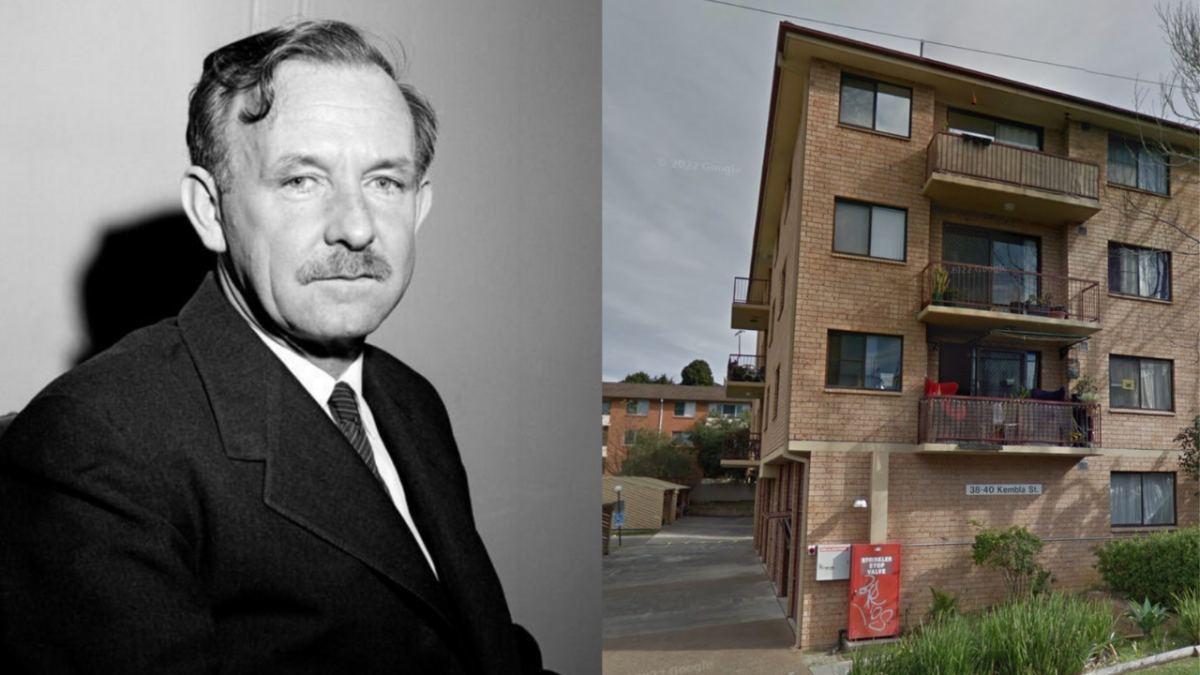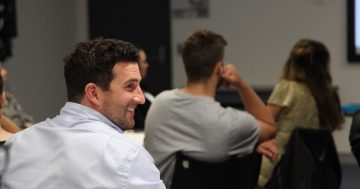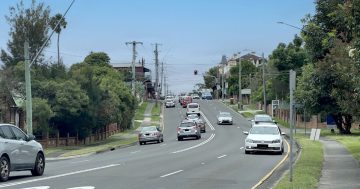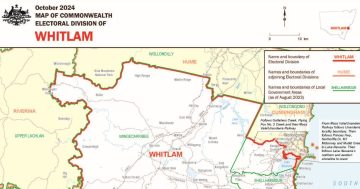
The one-time Wollongong journalist George Smith and the site of where he once lived before moving overseas on his way to a career with the UN. Photo: Supplied.
In February 1937, the radio announcer, war correspondent, movie director, diplomat, poet and author named George Ivan Smith AO (1915-1995) was living at 38 Kembla Street Wollongong.
He and his first wife were living in Wollongong because George had a got a job with the Australian Broadcasting Commission and became manager of the Wollongong Radio Station 2WL.
Smith, however, soon found himself collaborating with the actor, writer, director and producer Michael Pate (1920-2008) who went on to have many supporting roles in Hollywood films and American television during the 1950s and 1960s.
But George Ivan Smith was a most unusual young man and able to joke that prior to his arrival in Wollongong in 1937, he had spent all his life “behind prison walls” because his father, G F Smith, was the Governor of Goulburn Gaol.
For the time, his father had remarkably progressive views on prison reform.
Just prior to arriving in Wollongong, the Goulburn Gaol Governor’s son, however, had been a cub newspaper journalist for the Sydney Truth newspaper.
After just two years in Wollongong, Smith landed a job as a founding member of the new overseas short-wave broadcasting service, “Australia Calling” (1939–1941) which was later named Radio Australia.
With that experience George Smith was seconded to the BBC Overseas Service in London in 1941. There he became Director of the Pacific Service and organised overseas coverage of the Second Front during World War II.
At the war’s end Smith joined the J Arthur Rank Organisation, where he worked until 1947 as producer, editor and director on a documentary series of films.
He then joined the United Nations – not bad for someone landing in Kembla Street Wollongong just a decade earlier.
But in 1949 Smith did even better. He was sent to Britain as first director of the London United Nations Information Centre, remaining there until 1958.
During that time he was closely associated with UN Secretary-General Trygve Lie in developing the 1949 Armistice Agreements that supposedly were meant to end the never-ending 1948 Arab–Israeli War.
Now far from living a quiet life managing in Wollongong, Smith was soon embroiled in some very bloody international operations.
The Republic of Katanga was a breakaway state that proclaimed its independence from Congo in July 1960. Alarmingly, this had been made possible with the support of a mining company with concession rights in the region and was also supported by a large contingent of Belgian military advisers with long-term commercial interests.
Tragically, the Katanga Rebellion seems to have been conceived in direct opposition to Patrice Lumumba’s newly independent Democratic Republic of the Congo. And in less than three months Lumumba was kidnapped and murdered inside the breakaway state.
This took place despite the fact that Lumumba had sent a telegram to the UN Secretary-General insisting that something be done about “Belgium’s military aggression” and its overt backing of Katangese secession.
What had likely also assured Lumumba’s assassination was that with the UN doing nothing, he sent a telegram to Soviet Premier Nikita Khrushchev, requesting Khrushchev closely monitor the situation in the Congo.
Today it is generally agreed that while the US and Belgium actively plotted to murder Patrice Lumumba, the British also secretly wanted to get rid of him because they too believed Lumumba posed a threat to their own mining interests in the Congo.
So it was not a pleasant time for a former humble Wollongong radio station manager to be involved with two of the United Nations’ great failures – the Arab-Israeli conflict and the Congolese struggle for independence.
Indeed, in 1961, after being appointed the United Nations Representative in Katanga by UN Secretary General Dag Hammarskjöld, Smith and a colleague were themselves kidnapped and beaten by Katangese paratroopers – yet survived through the intervention of an American diplomat.
Nonetheless, it all rocketed Smith towards the upper echelons of the UN and he was later appointed the Personal Representative of the Secretary General U Thant in East and Central Africa.
Moreover, in 1964 Smith was given the honour of delivering the Boyer Lecture for the Australian Broadcasting Commission titled “Along the Edge of Peace”.
By 1966 he became a visiting professor at Princeton University before ending his career as Director of the United Nations Office in London from 1968 to 1974.
Smith then retired to Stroud in Gloucestershire – a very long way from the prison walls of Goulburn Gaol and the fledgling offices of radio station 2WL in Wollongong’s Kembla Street.













